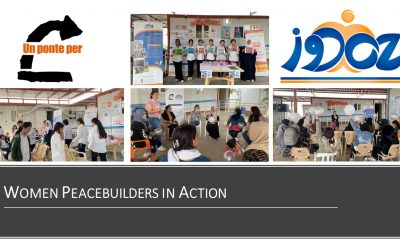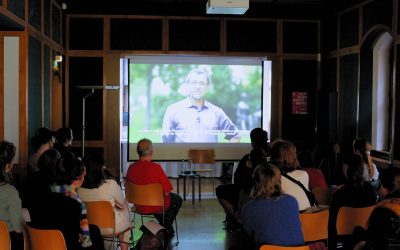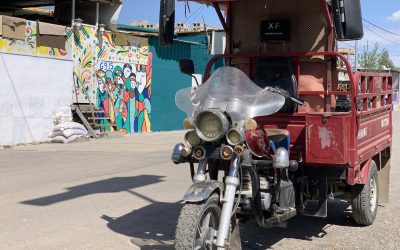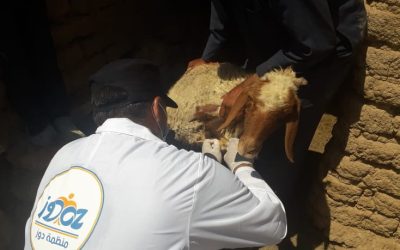Frei Will Ich Project – Germany
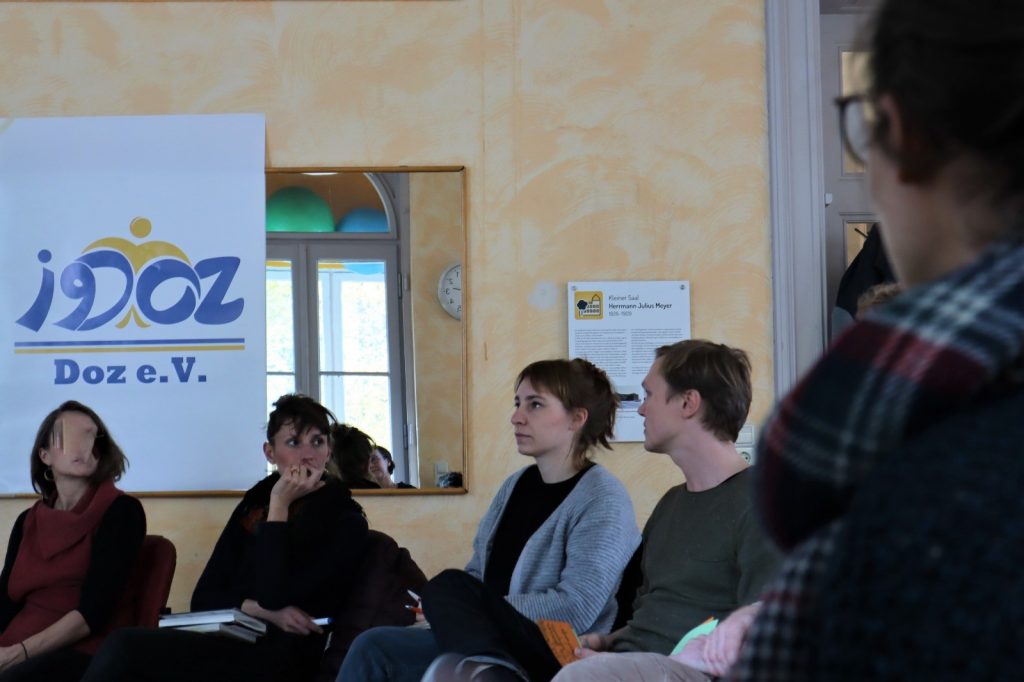
Involvement of Migrants in the Municipal Community
Project Summary
What is “Free Will Ich”?
“Frei Will Ich!” is a participation project of DOZ e.V. in Leipzig, funded by the Federal Agency for Civic Education (BpB). Our project aims to strengthen the engagement and participation of young adults with a migrant background by organizing thematic workshops and providing practical work experience and engagement opportunities in Leipzig associations, civil society interest groups and in local politics.
What is The Project About?
In view of the turbulent political situation and the rise of right-wing populism in Europe and the world, there is an urgent need for action. A rise in extremism is evident across the political spectrum. This increases the urgency to get actively involved in the humanitarian, social or political spheres. Against this background, we as DOZ e.V. see the need to organize the project “Frei Will Ich!” and thus strengthen the commitment of young adults in Leipzig and Saxony. This is done in theory through workshops thematically related to volunteer work. At the same time, we offer the opportunity to get involved in practice for up to 3 months in associations, interest groups and local politics.
How Will The Project Work?
In 3 thematic blocks, we will jointly address the topic of engagement and develop opportunities for social and political participation. Starting in 2020, the 3 blocks will begin with 4 workshops each, followed by engagement opportunities and monthly reflection sessions:
– February – May 2020: Engagement in associations
– May – October 2020: Engagement in civil society advocacy organizations
– October 2020 – March 2021: Engagement in local politics
Who Can Participate in The Project?
We primarily target young adults with a migrant background who have a desire to get involved in Leipzig.
Why Should You Participate in The Project?
You want to get involved?
You want to try out and get to know new occupational fields?
You want to help shape Leipzig?
You want to make a difference in your community?
You want to get involved in a political or social issue, but don’t know how?
If you can answer yes to even one of these questions, then our project is the right place for you!
We help you to find a suitable position in a Leipzig association, an interest group or in local politics. We accompany you during the first contact and are always available for advice afterwards. Together with the theoretical practice gained in the workshops, we offer you a good basis for future engagement.
What Do You Learn in The Workshops?
The workshops prepare you for a subsequent commitment in Leipzig associations, civil society interest groups and local politics. They provide you with important knowledge about possibilities and structures of engagement, structures of the corresponding institutions as well as content-related knowledge about different topics such as women’s rights, environmental protection, sports, humanitarian aid, politics and much more. In addition, we give you valuable tools for the work in these institutions: Methods of project management, strategies of communication and conflict management in international teams, tools for media and public relations, activity planning, budget planning and accounting and much more.
Where Do The Workshops Take Place?
Initially, the workshops took place in the VILLA Leipzig, Lessingstrasse 7, 04109 Leipzig. Due to the Corona virus, all workshops now take place online via Zoom.
Which Workshops Will Take Place in May and June 2020?
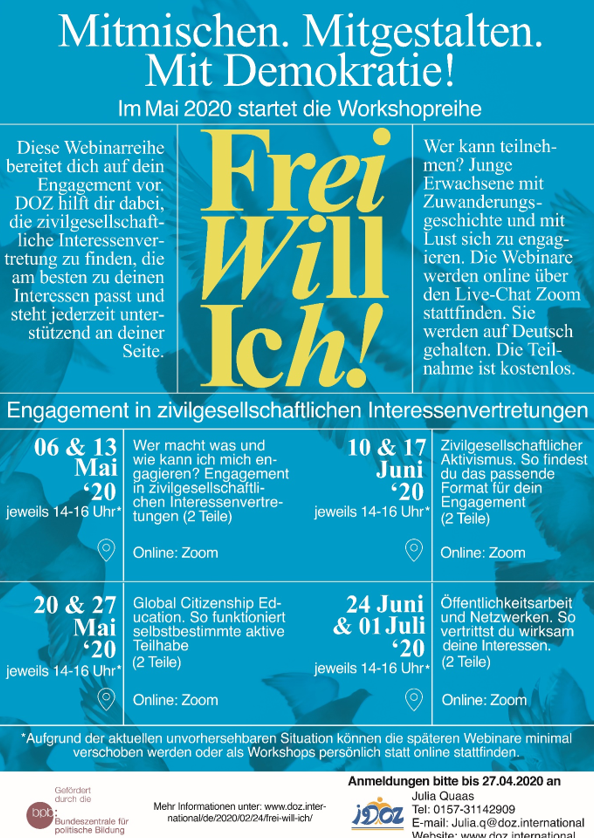
Which Workshops Took Place in February 2020?
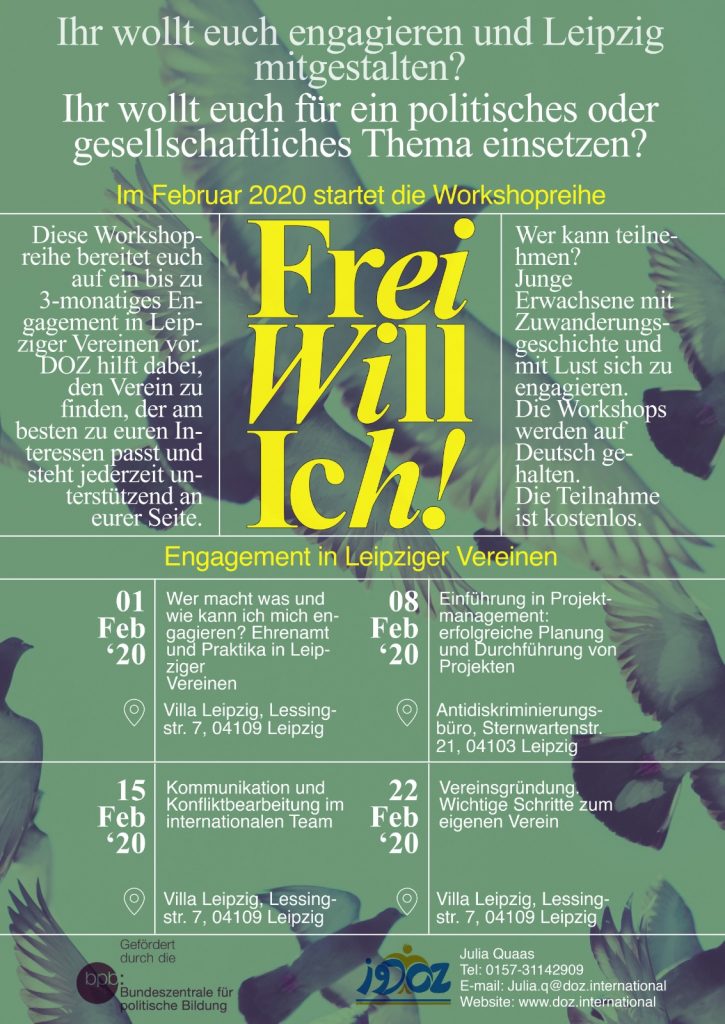
How Does The Placement Process Work?
In individual interviews and with the help of questionnaires, we will talk to you about your interests, expectations and wishes. We will then look for suitable institutions that can take you on as a volunteer. We will accompany you during the first contact and will be at your side for advice at any time during your commitment. Once a month, we meet with all participants in the form of reflection rounds, in which we discuss your experiences and possible problems.
Participation in at least 6 of the 8 preparatory workshops is a prerequisite for placement in a volunteer position.
Which Volunteer Positions Are Available For You?
We are in contact with over 100 Leipzig associations, civil society interest groups and representatives of local politics. These cover numerous topics and fields of work: Refugee aid, women’s and children’s rights, environmental protection, animal welfare, sports, humanitarian aid, politics, education, and many more.
What Language Skills Do You Need?
Since the workshops are held in German, participation requires a certain knowledge of the language. This will also facilitate the work in the institutions.
How Many People Will Participate in The Project?
The project has a guideline of 12 to 15 participants per thematic block. However, this value is not fixed and is flexible depending on interest and request. We are happy about every interested person!
How Much Time Should You Plan For?
Each thematic block starts with 8 weekly online workshops of 2 hours each.
Afterwards you should plan up to 3 months for a commitment in a Leipzig institution. In parallel, there will be reflection sessions once a month.
The duration and intensity of your engagement can be determined individually according to your capacities, so that you can decide for yourself how much time you would like to invest.
It is also possible to attend individual workshops that interest you. However, you are not entitled to a placement until you have participated in at least 6 of the 8 workshops in a thematic block.
How Much Does It Cost To Participate?
Nothing. Participation is completely free of charge. The project is sponsored by the Federal Agency for Civic Education (BpB).
How Can You Participate Even If You Don’t Live in Leipzig?
If you do not live in Leipzig but would still like to participate in this project, that is also possible. Please contact us so that we can find a possible solution.
How Can I Register?
You can register with Julia Quaas at julia.q@doz.international, by phone or Whatsapp at 015731142909.
How Can Leipzig institutions and Organizations Participate in The Project?
Would you as an association, interest group or local politician like to host a volunteer? Then please contact us!
The type and scope of volunteer activities are determined individually according to the needs and capacities of the institutions and the participating persons.
If you would like to host a volunteer, please contact the project coordinator: Julia Quaas
Contact: Shakespearestr. 18, 04107 Leipzig, 01573-1142909, julia.q@doz.international
Activities Implemented Under This Project
The Start – Information and Networking Events
Information Event For interested Participants on 09.11.2019
On Saturday, November 09, 2019, our “Frei Will Ich!” Information Event took place at Villa Leipzig, where DOZ e.V. met with interested participants. After the speaker Tarek Aziza gave an overview of the importance of volunteering and voluntary work, DOZ e.V. presented the new project “Frei Will Ich!”. Afterwards, the participants expressed their wishes, expectations and interests. This was particularly important in order to plan the next steps in the project and to include the interests of the participants in this process.
At the first information meeting on 09.11.2019, it became clear that the personal interests of the participants are very diverse. They range from environmental protection, human rights, women’s and children’s rights to sports and culture. DOZ will incorporate these interests into the planning of workshops and engagement opportunities in Leipzig. Numerous contacts have already been made with Leipzig associations and initiatives that are active in these areas and would host volunteers as part of the project.
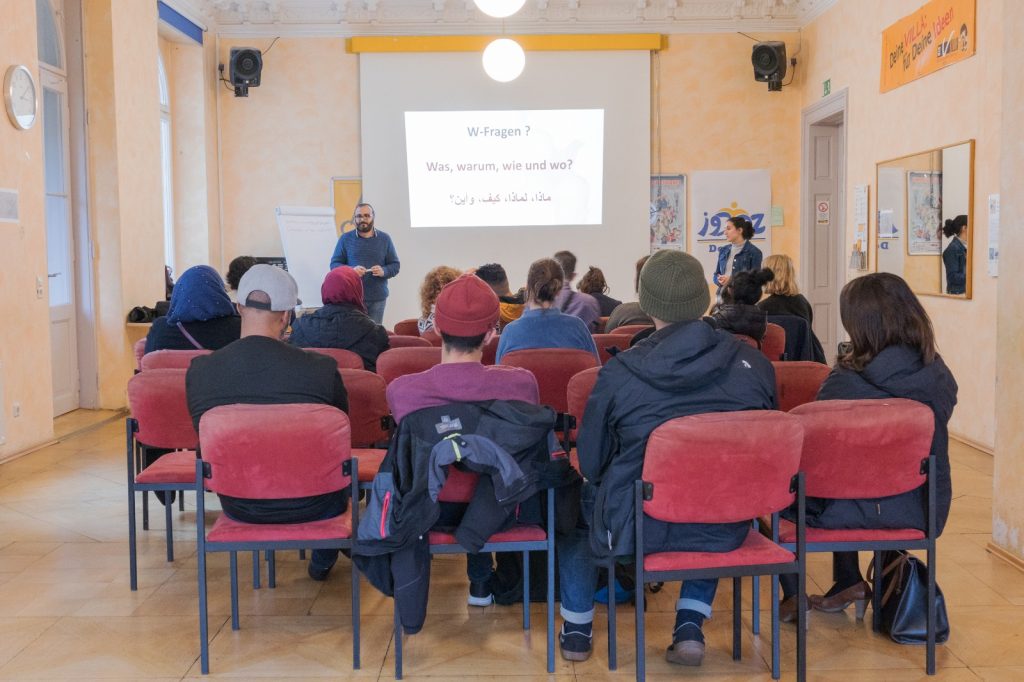
Networking Meeting with Leipzig Associations, CSOs, and Local Politics on 12.11.2019
On Tuesday, November 12, 2019, our “Frei Will Ich!” networking meeting took place at Villa Leipzig, where DOZ e.V. met with interested Leipzig associations and institutions. Thereby we could get to know each other, plan future steps of cooperation and exchange wishes and expectations for the project.
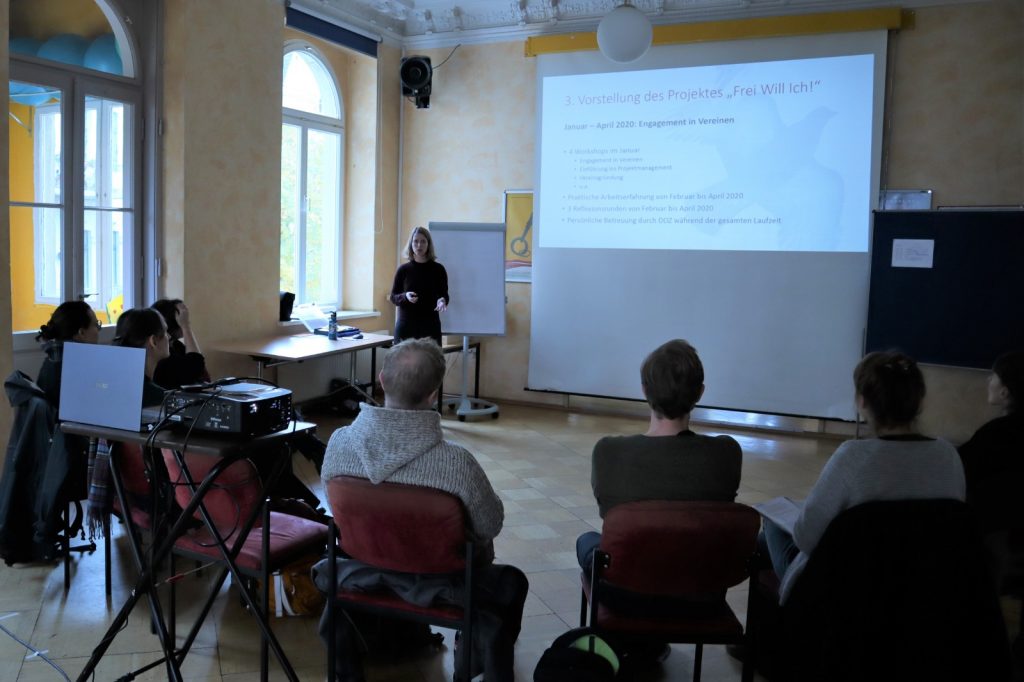

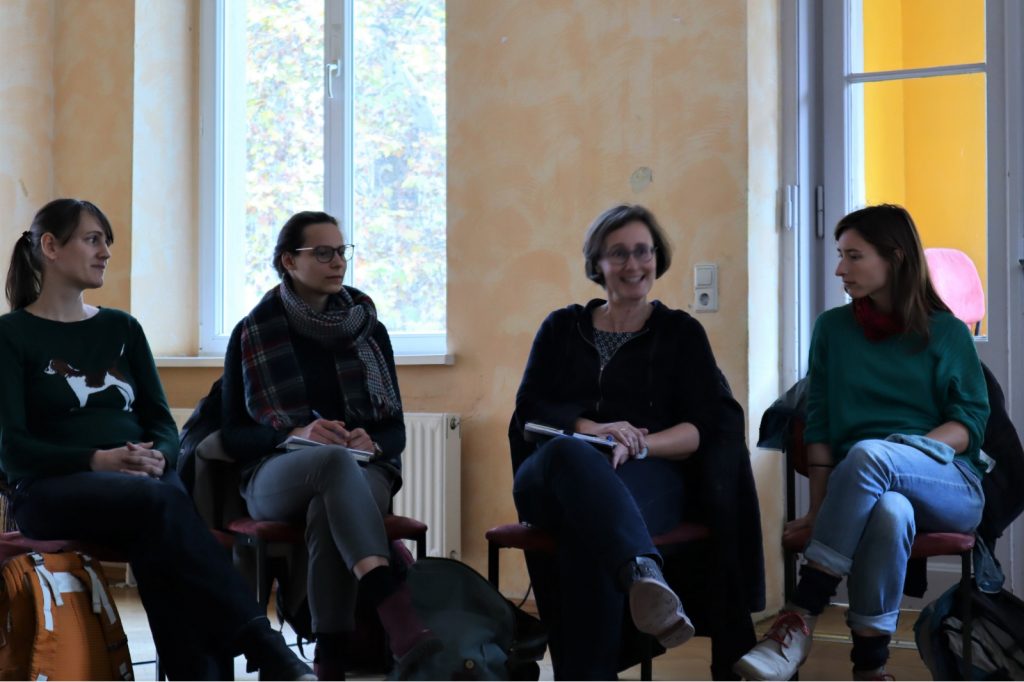
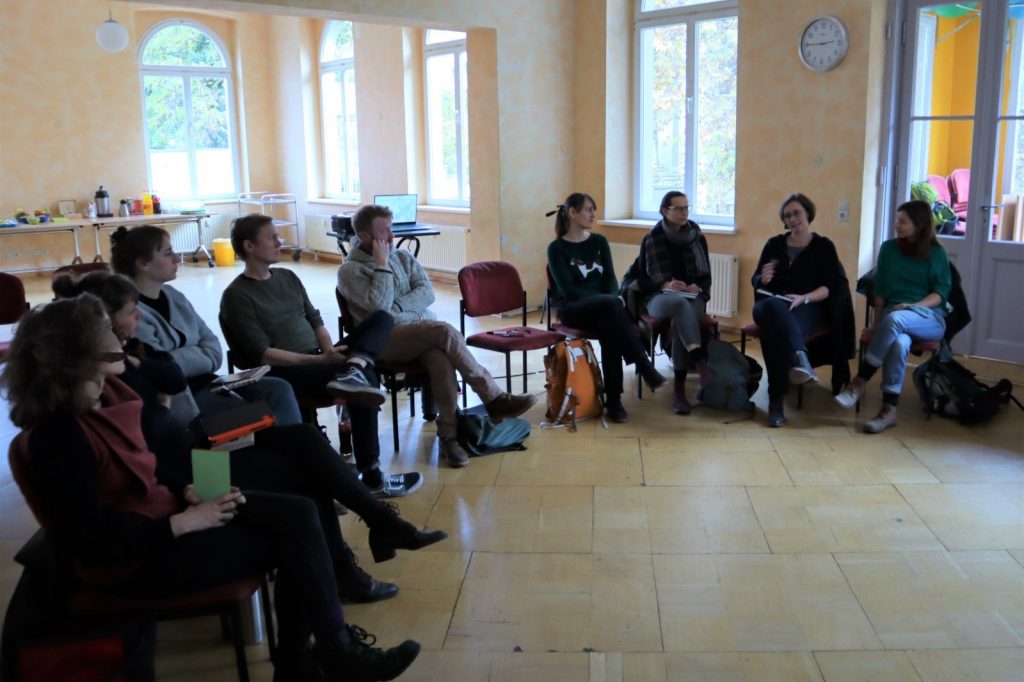
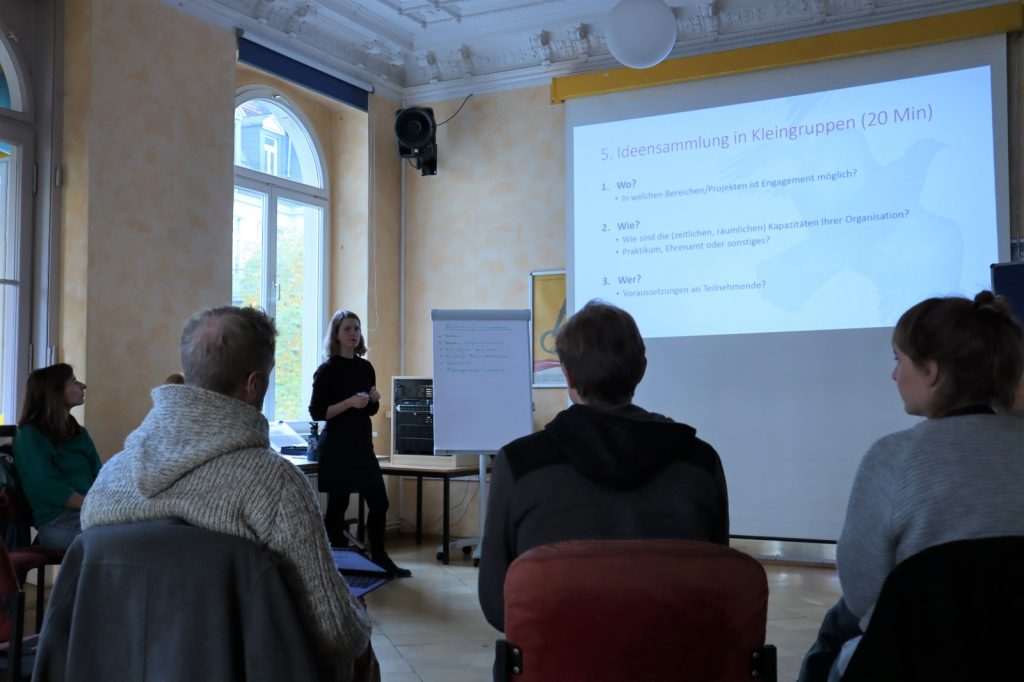
The First Thematic Block: Engagement in Associations and Organizations
Introductory Workshop: Volunteering in Leipzig Organizations
On 01.02.2020 from 11 am to 5 pm the first workshop within the project Frei Will Ich! of DOZ e.V. took place in the VILLA in Leipzig. Under the motto “Who does what and how can I get involved? Volunteering and internships in Leipzig”, the 12 participants as well as the organizers and associations were able to get to know each other. Under the direction of Karola Kunkel, the day was a complete success with interactive tasks on the topic of association involvement as well as the presentation of some of the participating associations.
The day began with a colorful round of getting to know each other, which quickly loosened up the group through games and laid the foundation for the good mood and curiosity of the participants. The warm and positive atmosphere characterized the workshop day and facilitated friendly cooperation and extremely committed group work.
After getting to know each other, the participants were given the opportunity to formulate questions and expectations for the day ahead. The central question was what exactly commitment means and how associations function in this context. The project coordinator, Julia Quaas, then presented the Frei Will Ich! project before representatives of some of the participating associations introduced themselves to the group.
Getting to know the associations was particularly popular among the participants. It gave them the opportunity to experience commitment up close and in concrete examples. The representatives of associations such as Wir sind Paten, Queerbeet, Leselust, Bunte Gärten and DGhK talked about current projects, brought flyers and provided information about potential tasks for future volunteer involvement.
After open questions had been clarified and all participants had exchanged ideas about engagement opportunities, the meeting continued after the lunch break with concrete tasks to clarify the questions defined at the beginning. In interactive small group work and subsequent short presentations, the participants were able to define why engagement is important and what they personally associate with it.
A short test to assess their own strengths prepared the volunteers for the task of creating a creative profile of their own motivation and personality. Some participants presented this to the group at the end and became very creative in presenting their own goals and strengths.
In a final feedback round, the presentation of the associations turned out to be particularly positive among the volunteers. Thus, the successful day was concluded by a final conclusion, which is not only symbolic for the group, but for the whole project: Helping is contagious!
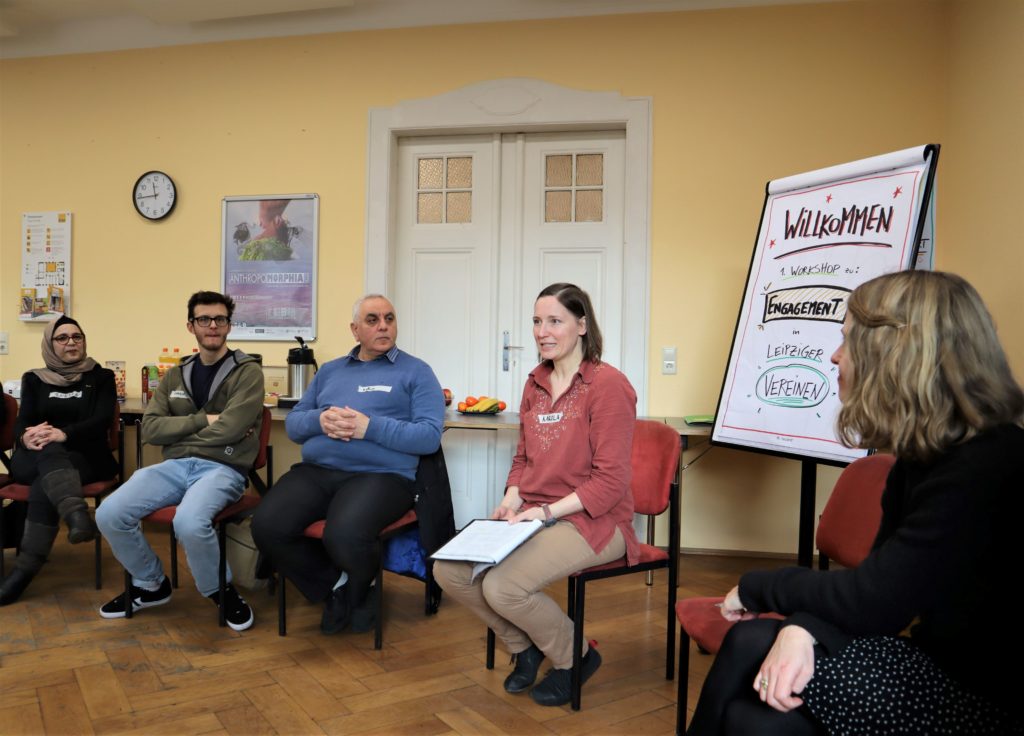
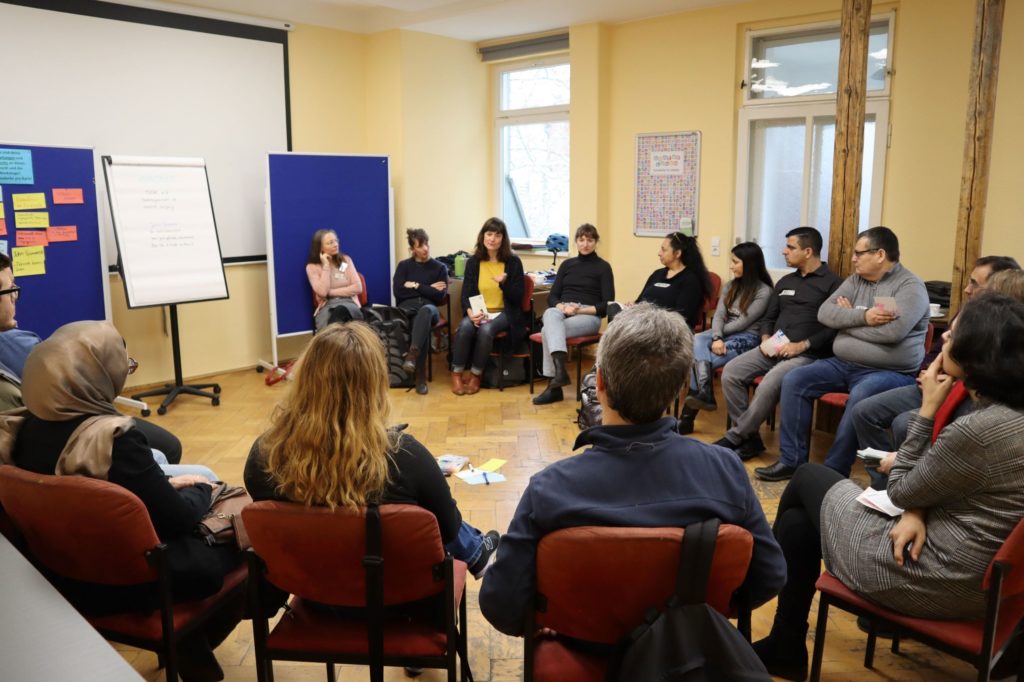
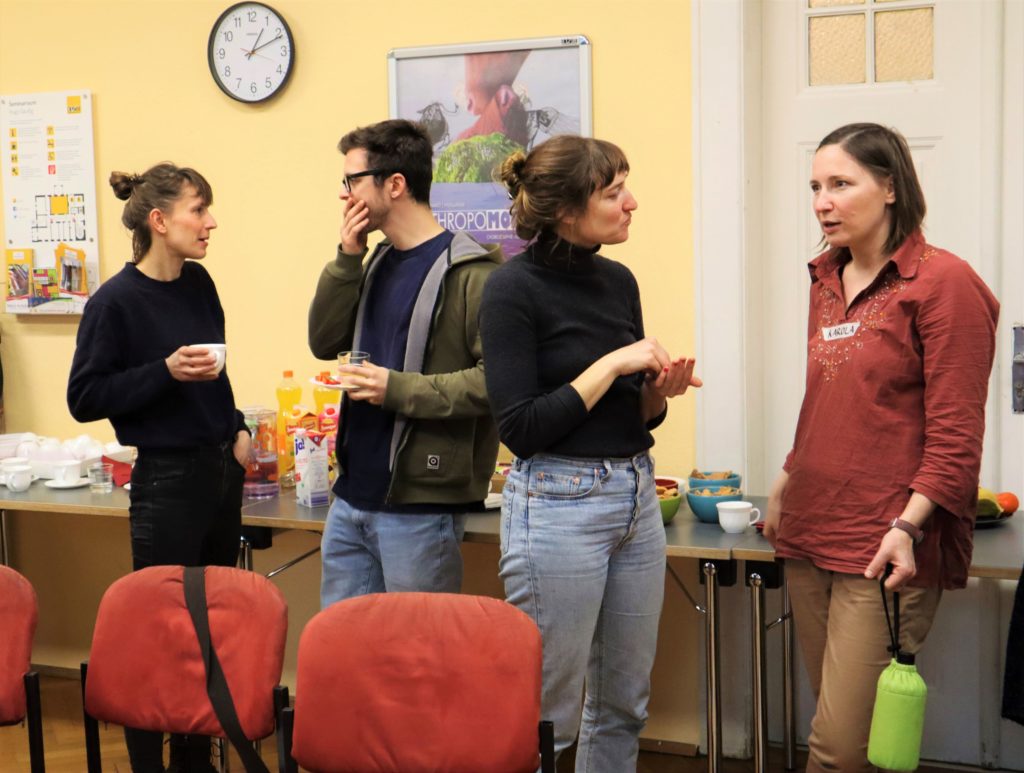
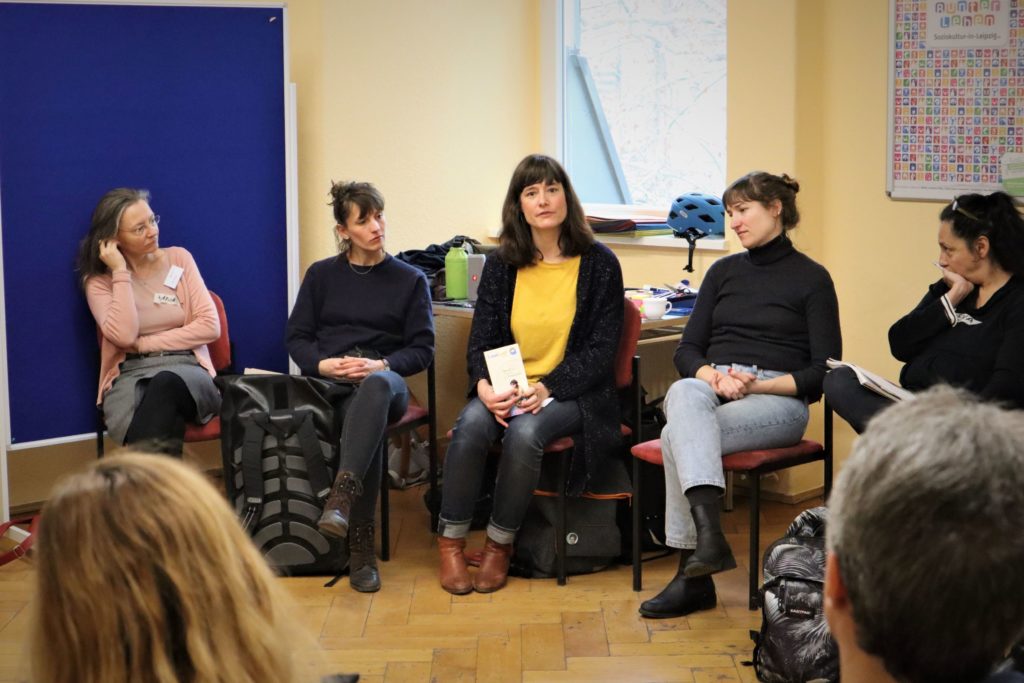
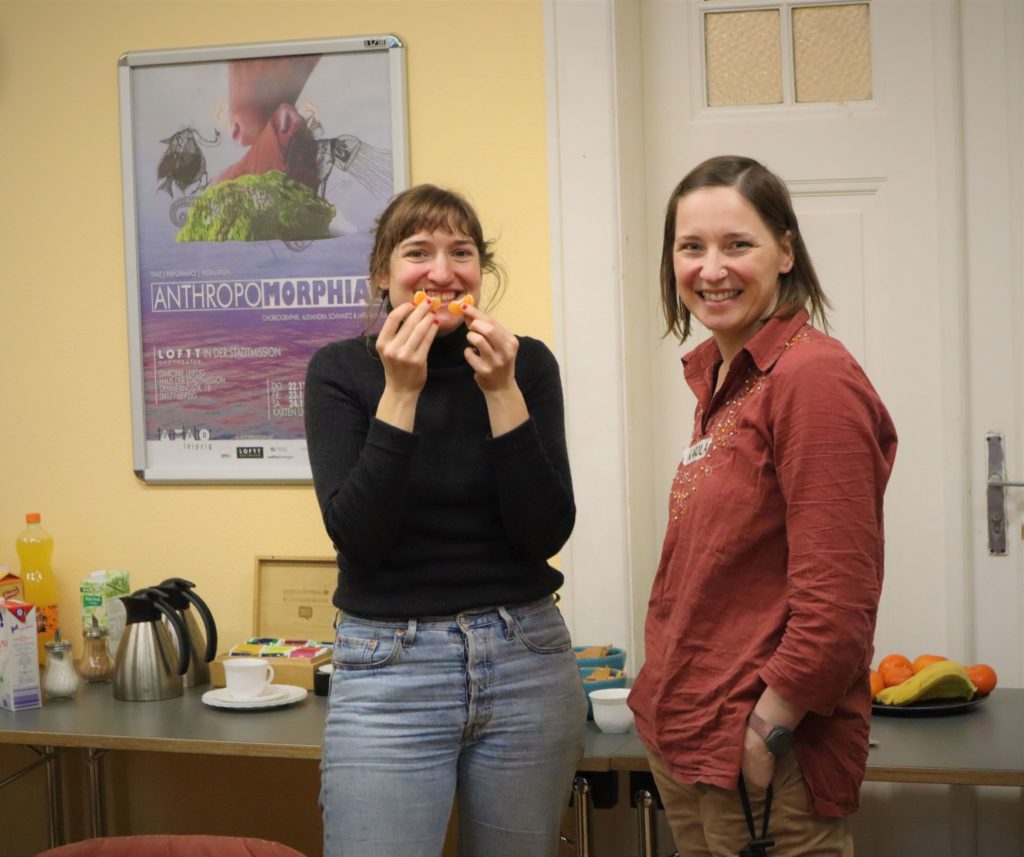
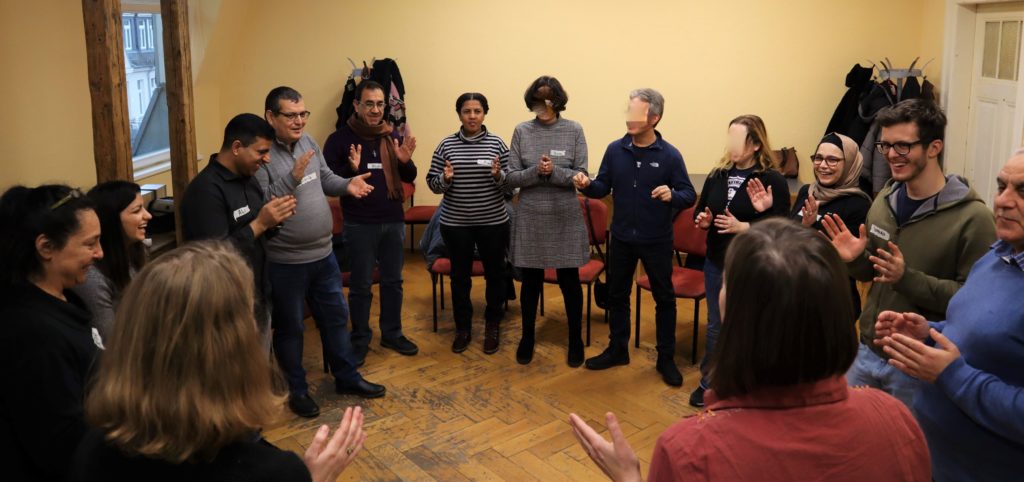
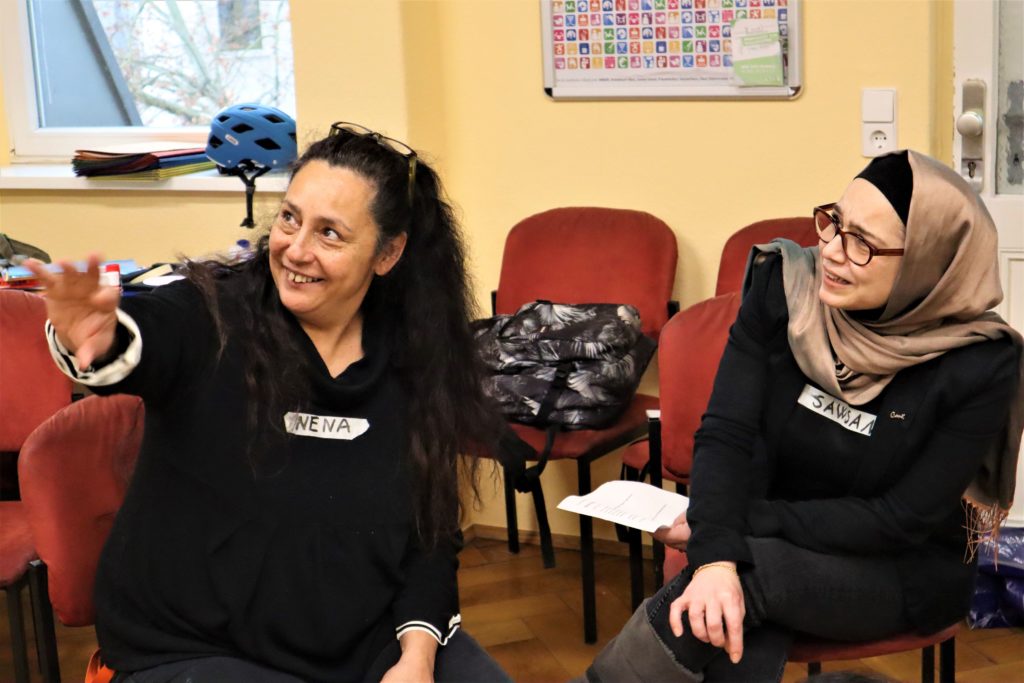
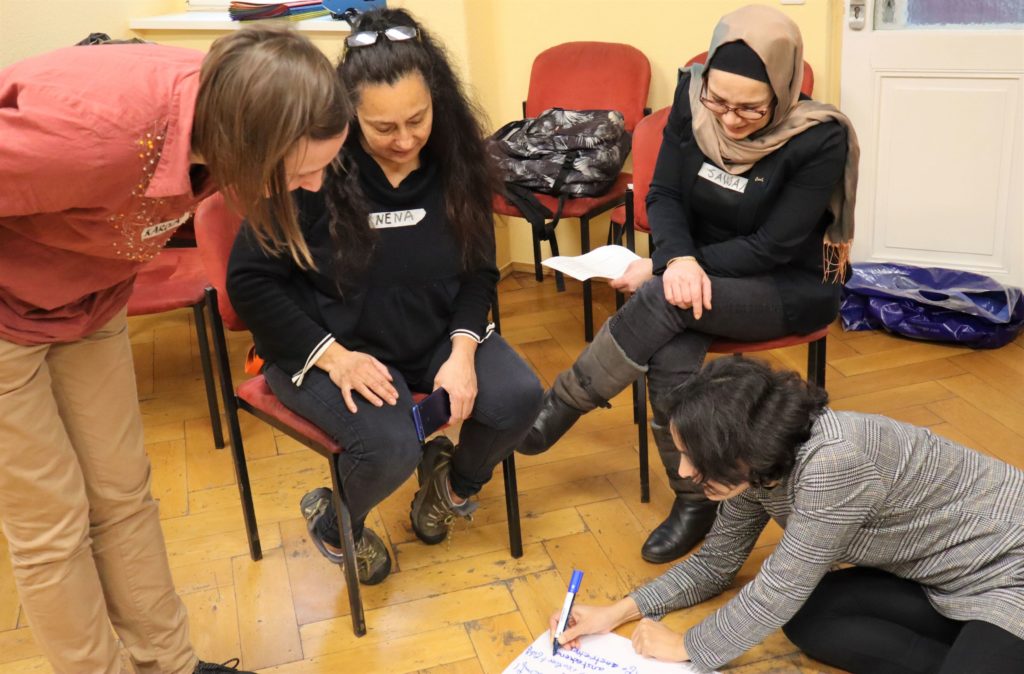
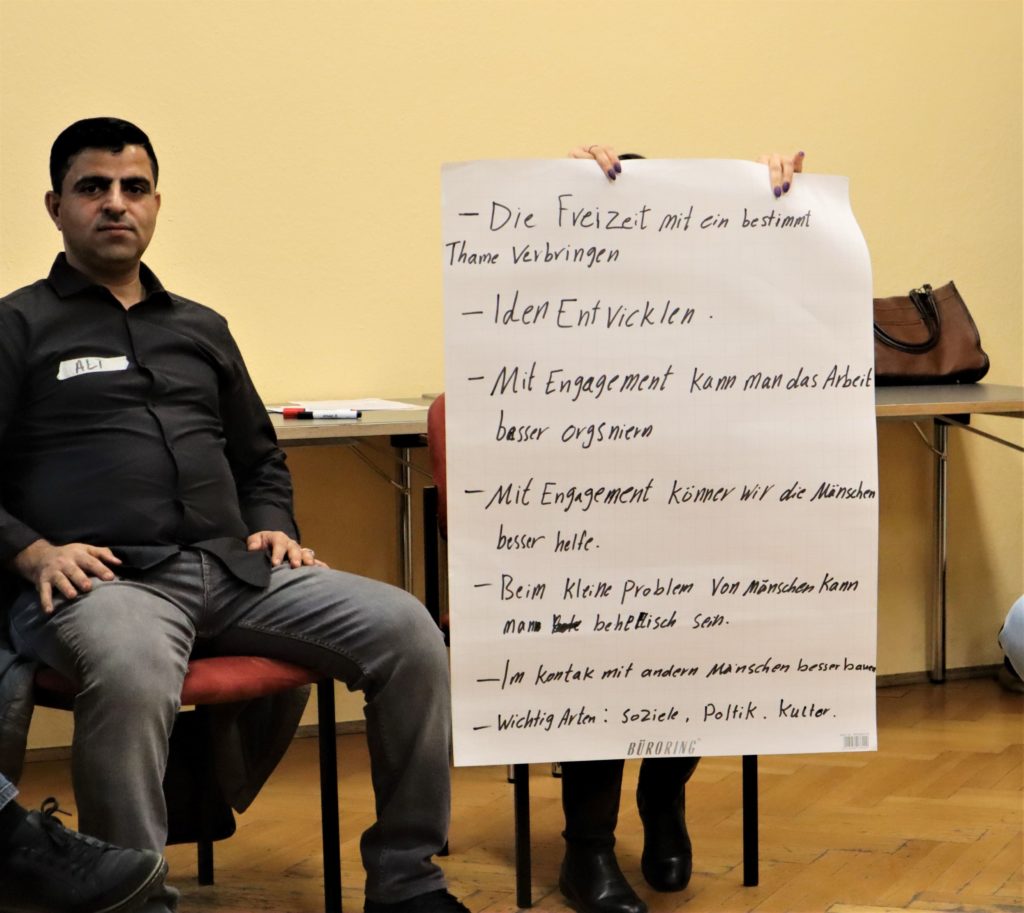
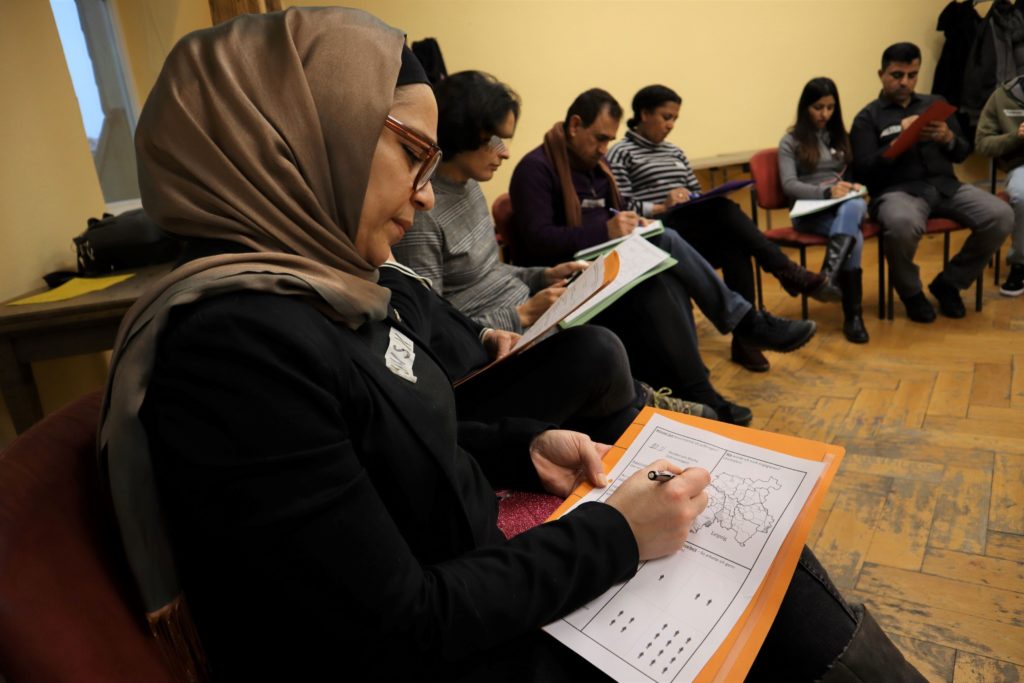
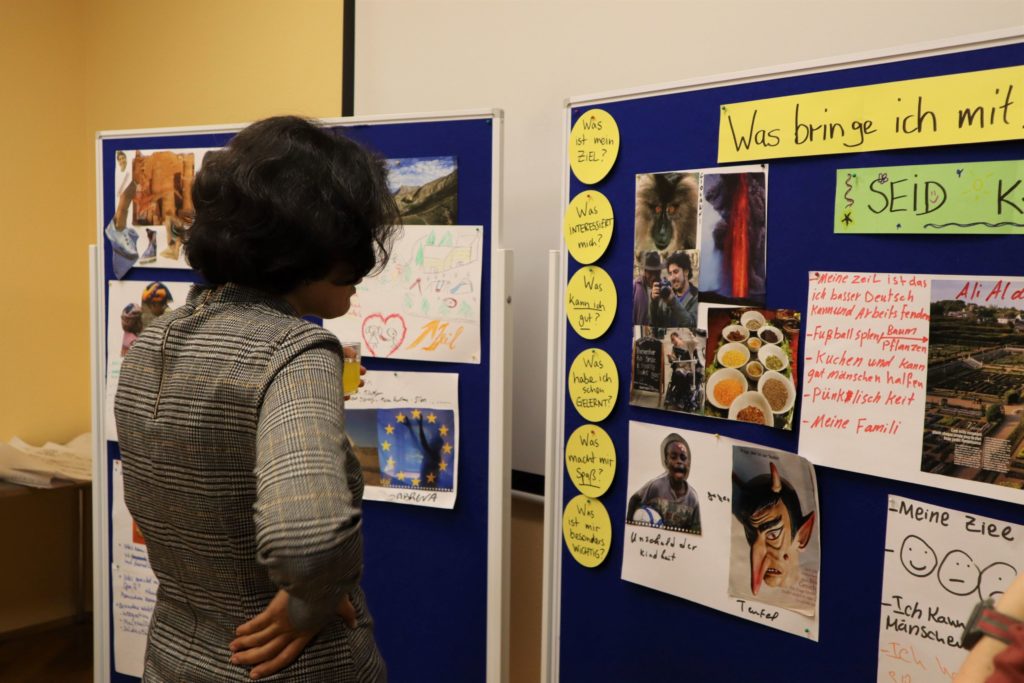
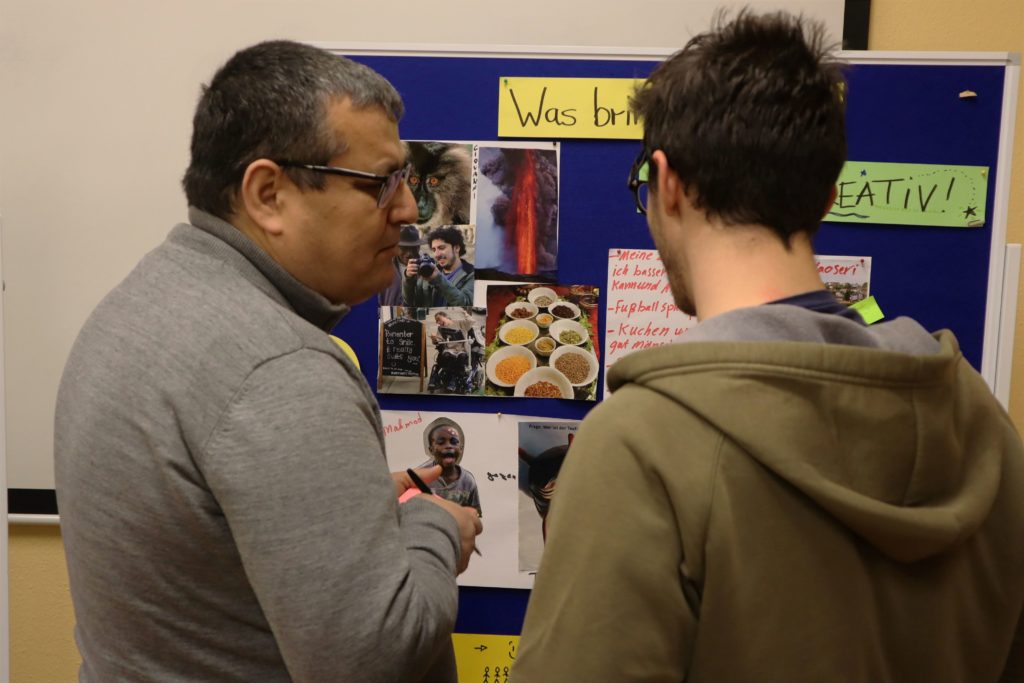
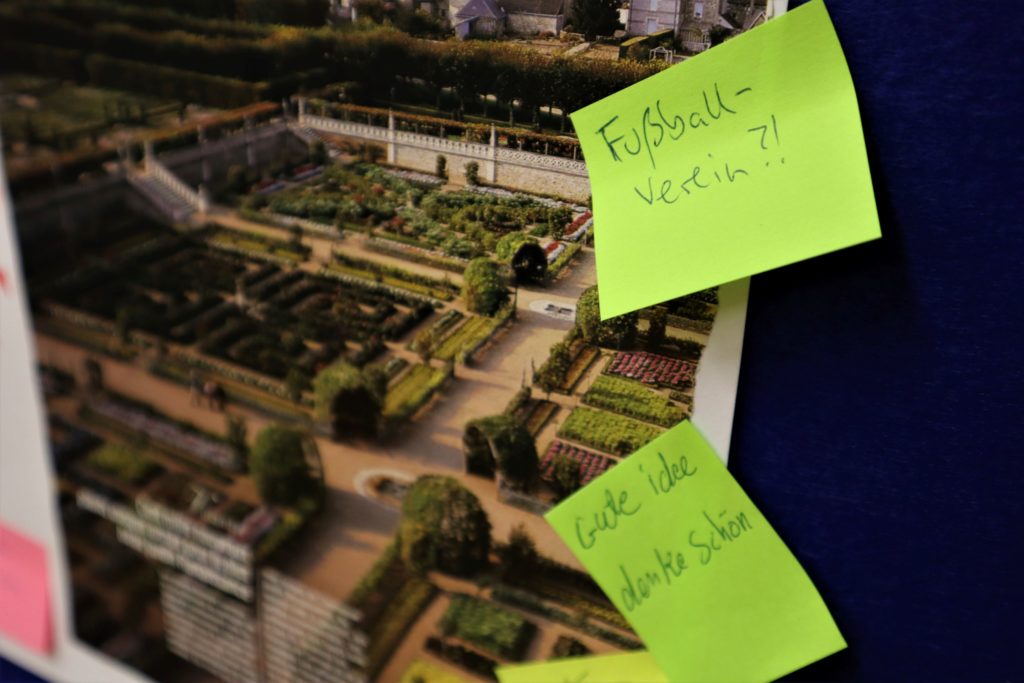
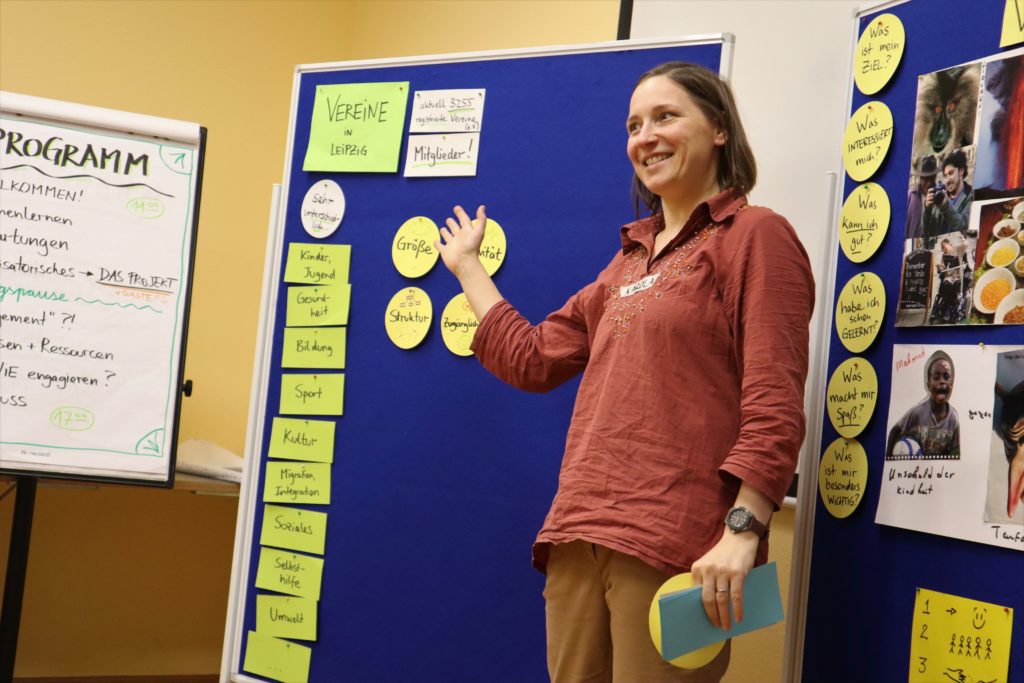
The First Thematic Block: Engagement in Associations and Organizations
Workshop on Project Management: Project Successful Planning and Implementation on 08.02.2020
On 08.02.2020 the second workshop of the “Frei Will Ich!” workshop series took place at the anti-discrimination office in Leipzig. After all participants got to know each other last Saturday and received basic information about engagement opportunities and about the project “Frei Will Ich!”, this workshop was about project management. As in the last workshop, representatives of associations were invited to present their association and volunteer opportunities. This time we had the pleasure to welcome Helena Teufel from Dresdner59.
The very experienced trainer Nora-Elise Beck summarized the most important aspects of project management in a short time. Together the group was able to work out what is necessary for a successful planning and execution of projects. Questions were answered such as: What is a project? What is project management? What does a project management cycle look like? What skills and competencies are needed to successfully implement a project? With the last question it became clear that the necessary competencies are endless and can never be fulfilled by a single person. Instead, it is even more important to build a good project team in which the members complement each other with their skills.
To make the topic of project management more tangible, the participants were asked to become active themselves and organize a dinner with friends in groups. The exciting thing about this task was that each group had the same task, but pursued different goals with the dinner and had different starting situations. While one group’s goal with the dinner was to meet new friends, another group wanted to use it to settle a dispute between two friends. A third group, on the other hand, organized a dinner with the goal of finally eating their fill and filling their own refrigerator with the leftovers they had brought along. All groups became very creative and came up with amazing ideas for the theoretical implementation of these mini-projects.
Afterwards, the project “Frei Will Ich!” was used to explain what goes into a project proposal. Explaining this with a concrete project was very helpful. In this way, it was possible to convey to the participants what role they themselves play in this project and that they contribute an important part to its success.
One participant said, “The workshops organized by DOZ were very useful for my work in the association, and I also acquired knowledge that is applicable to my personal life, especially in the area of project management. The group dynamics created a good environment for interaction with the other participants. The information was delivered in a simple and understandable way. It was also useful to learn about the work of the invited associations to promote joint collaboration.”
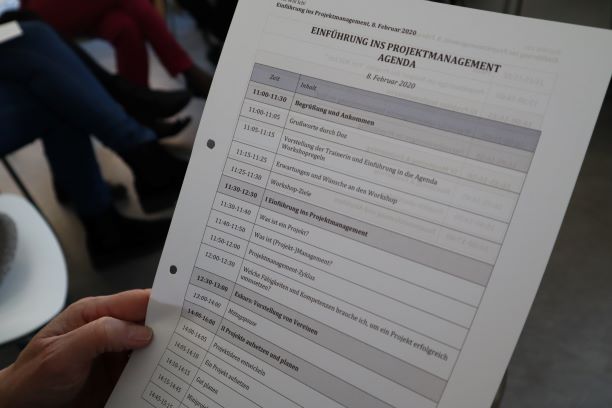
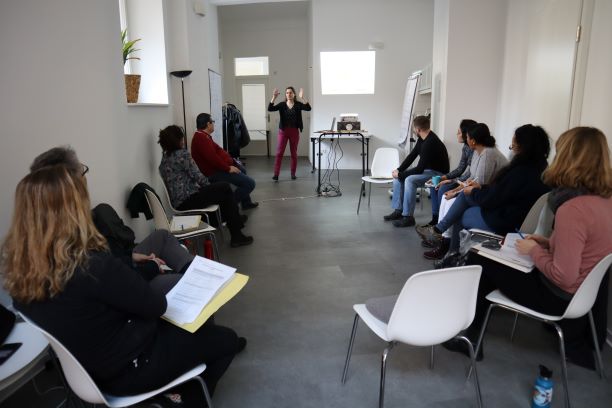
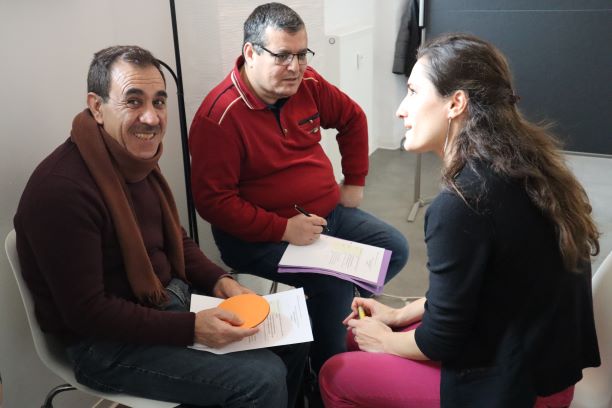
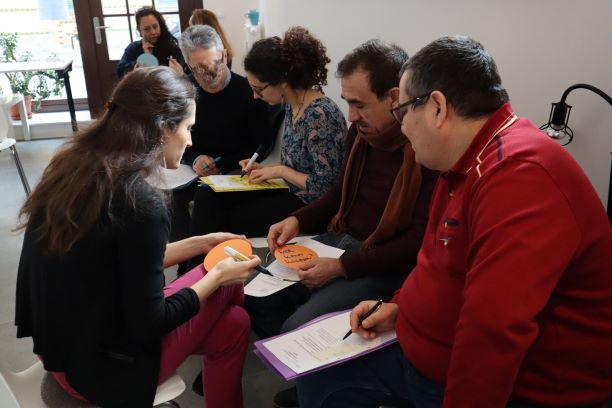
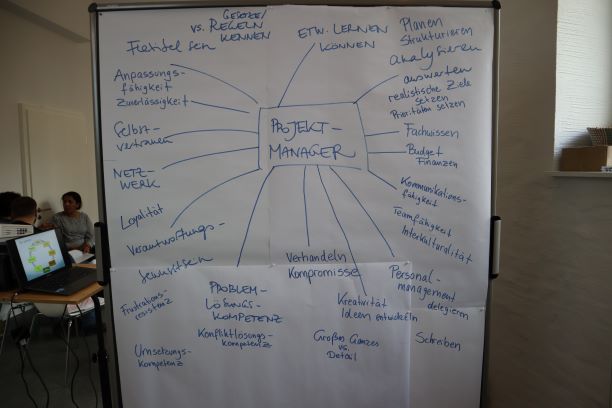
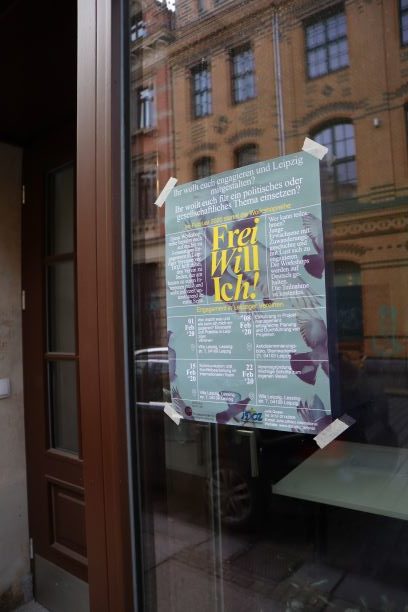
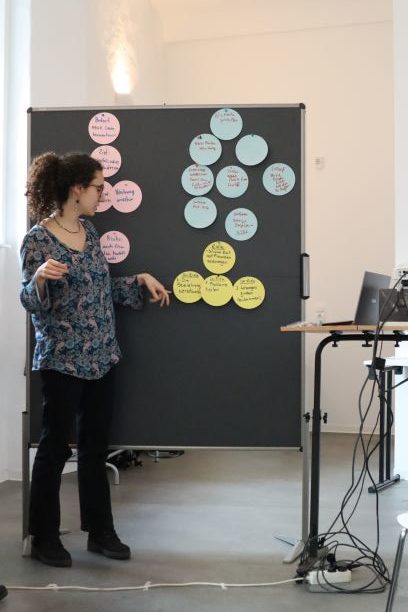
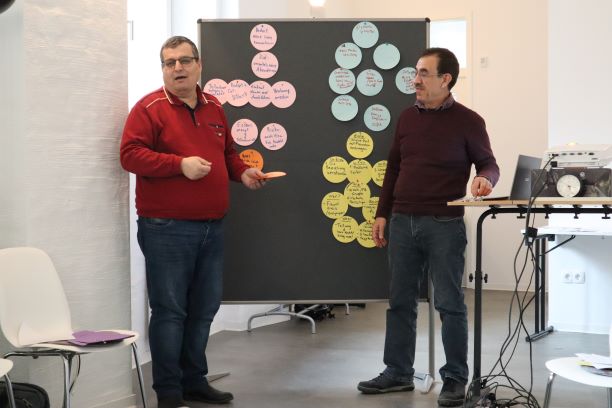
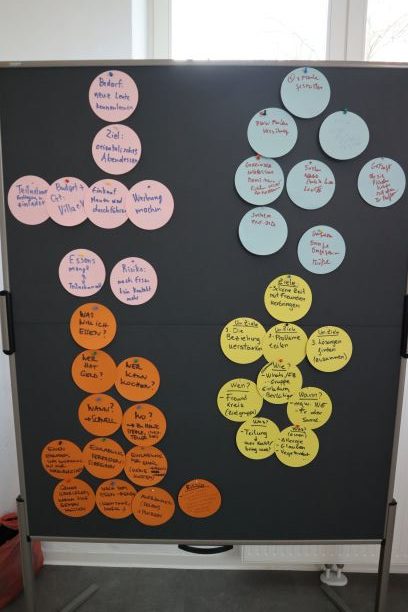
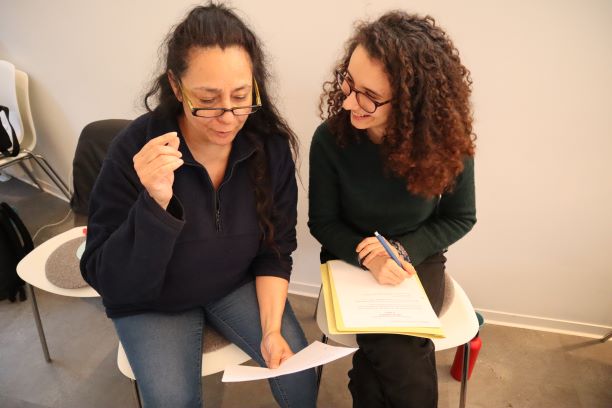
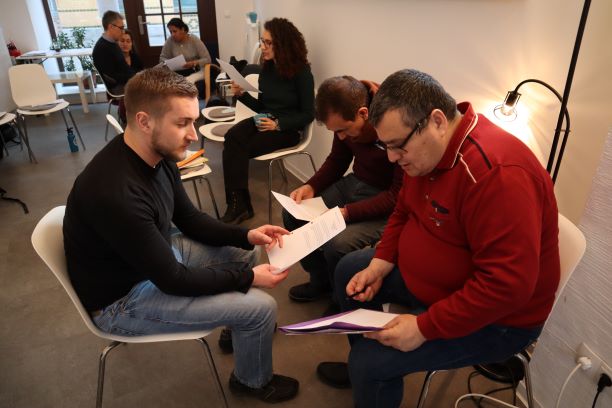
The First Thematic Block: Engagement in Associations and Organizations
Workshop on Communication and Conflict Management in International Teams on 15.02.2020
On 15.02.2020 from 11 am to 5 pm the third workshop within the project Frei Will Ich! of DOZ e.V. took place in the VILLA. This time it was about an important topic in the context of teamwork in the engagement: communication and conflict management. At the same time, the 8 participants again had the opportunity to get to know three Leipzig associations that offer engagement in March.
Starting from the point of view that conflicts can be helpful in situations and can mean development, the day was dedicated to the topic of conflict resolution. The day started with a round of experiences. Each participant reported on a conflict from a private or professional context. The personal conflict experiences were repeatedly included in the workshop throughout the day, in order to ultimately find an analysis of the situation and possible approaches to solving it.
After a definition of what a conflict basically means, the model of escalation levels was explained and discussed together using the personal examples shared. Together with workshop leader Karola Kunkel, the participants analyzed the dynamics that a conflict can take on, clarified terms such as self-infection and defined the limit of self-help within a conflict.
Before the lunch break, the Gesellschaft für Völkerverständigung e.V., the Leipziger Syrienhilfe e.V. and the FC Blau-Weiß Leipzig introduced themselves. During a joint meal, questions were clarified and networking took place. Karola Kunkel then presented Schulz von Thun’s communication model to the participants. Together, various conversation situations and misunderstandings were analyzed on the four sender and receiver levels. The factual, relational, appealing and self-statement levels are basic tools of communication analysis and offer a lot of space for reflection of self-perception and perception of others.
At the end of the workshop, the topic of needs and self-reflection was on the agenda. Through the model of the so-called “need onion”, the group was shown the motives and motivations for which people act and the role that personal need plays in a conflict. Here, too, reference was made at the end to the participants’ own conflict experiences discussed at the beginning of the workshop by jointly identifying the needs that might have motivated the conflict parties.
Finally, the participants left the day with a positive feeling. “The workshop helped me to deal with conflicts better. I can now think carefully about why a person acts and at what point I can no longer resolve a conflict on my own,” reported one participant.
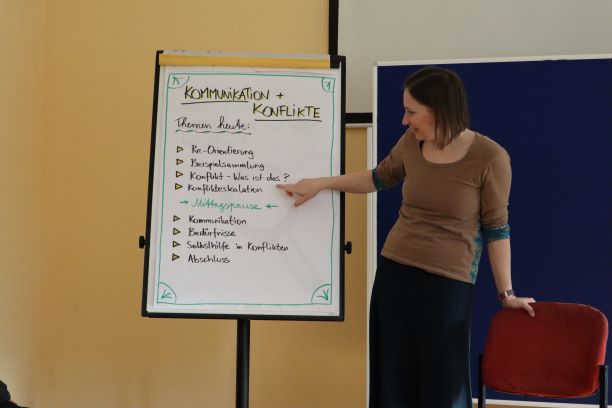
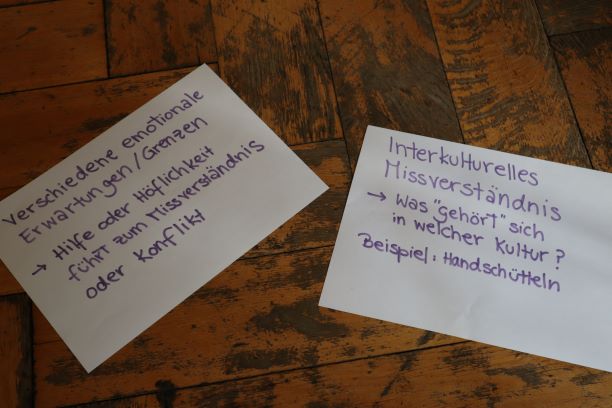
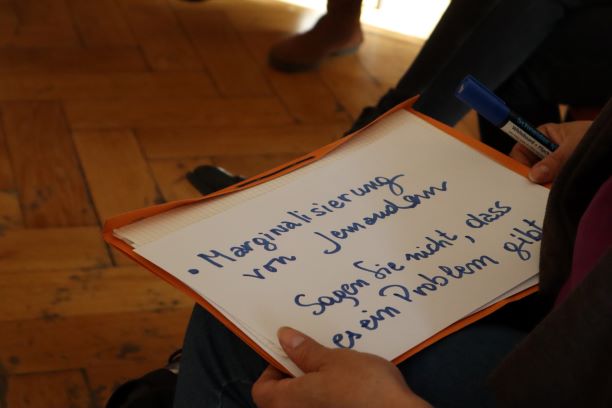
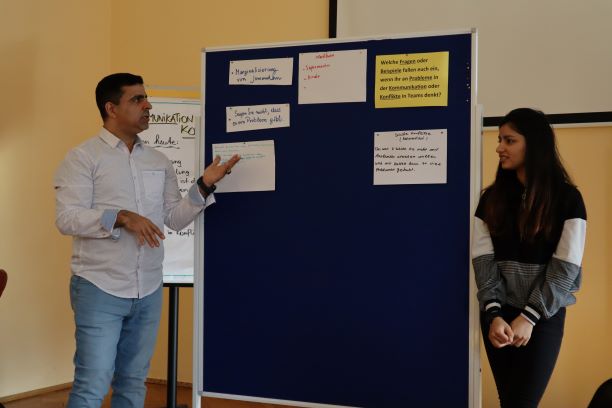
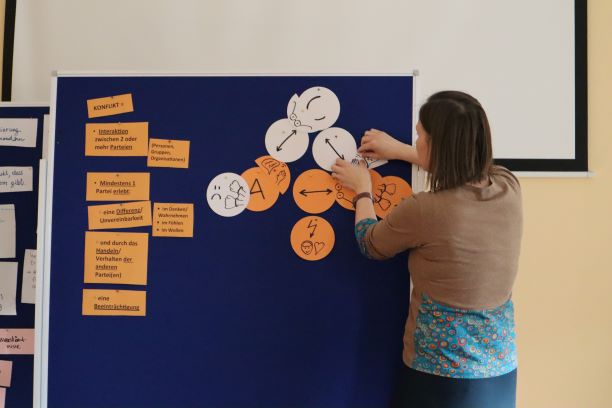
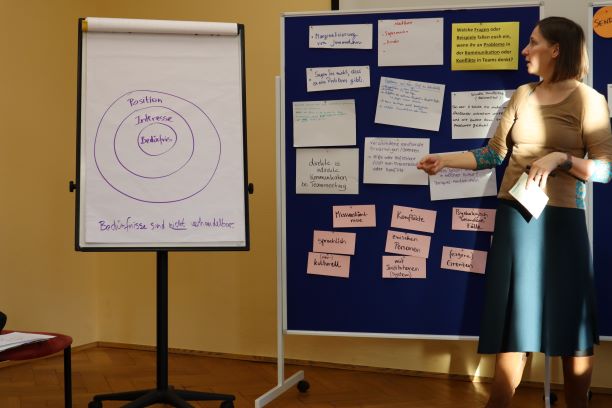
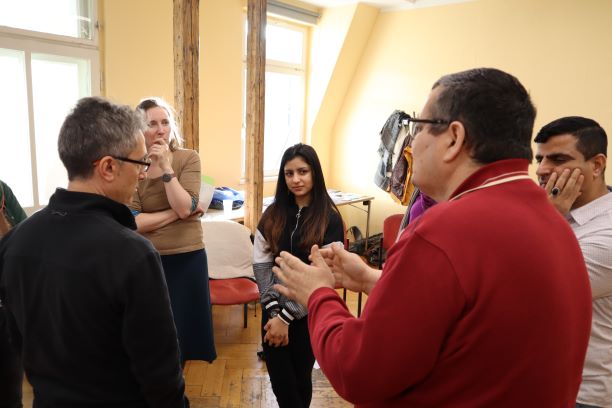
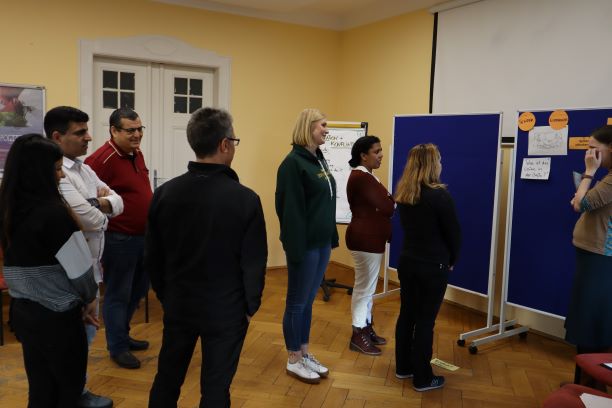
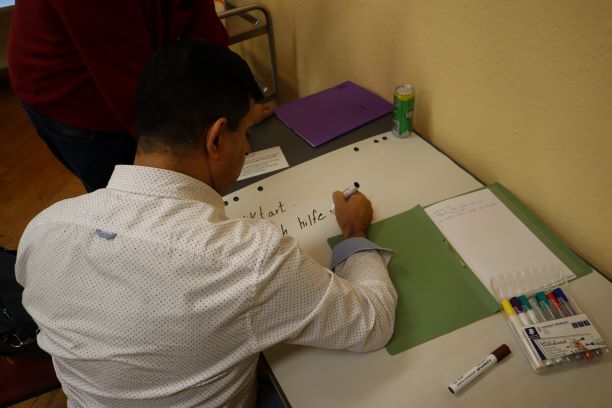
The First Thematic Block: Engagement in Associations and Organizations
Workshop on Founding an Association or Organization: Important Steps for your Own Organization on 22.02.2020
In Leipzig’s sociocultural center “Die VILLA” took place on 22.02.2020 the last workshop of the first Frei Will Ich! Workshop series over commitment in associations of DOZ registered association took place. Under the leadership of speaker Karola Kunkel and the topic “Founding an association: Important steps to your own association”, the 7 participants were able to learn in a relaxed and dynamic atmosphere what is fundamental to found their own association.
To start in a good mood, the day began with a “warm-up” game. After that, the participants were ready to start. As a central first point, the 5 aspects of association management were explained: personnel aspects (“the people who participate in the association”), communication (public relations), ideational aspects (basic purposes of an association) and finally financial and legal aspects. The focus of the workshop was on the last 3 aspects. And what could be better than two existing association examples to better explain the theory? DOZ e.V. and Friedenskreis Halle e.V. were taken as models and examples throughout the session.
Before we got to the third topic of association law, the participants were given the first exercise in the form of a formulated question: “What purpose would my association have?”. Versatile ideas came out of the round of answers. From sustainability and environmental protection as general ideas, to more concrete goals such as an association for Latin American-German friendship.
Karola Kunkel gave important and clear hints about the laws of association foundation. Above all, the principle that all information is recorded in the “Civil Code” (BGB). How important it is in the first step to draw up the statutes of an association carefully was a central point of this part.
Getting to know Leipzig’s associations was also a popular part of the day, as it had been in previous workshops. This time, the German-Spanish Friendship Association, Interaction Leipzig, the Johanniter sponsorship program and the Family Relief Service, among others, presented themselves.
After the lunch break, there was a small excursion and the participants received useful tips and tools on project management, as a desired extension to the second workshop of the project. These tools included Excel and Word templates and programs such as Trello and Zoom. After that, the workshop continued again with the association foundation topic, namely association financing. Karola Kunkel told about well-known possibilities such as donations, crowdfunding or membership fees, as well as funding programs that could be applied for if one wanted to found an association in Leipzig. In a final group task, the advantages and disadvantages of founding a new association or supporting an existing one were reflected on in summary form.
In a final round, the participants as well as the coordination team of DOZ e.V. and the speaker were able to share opinions, feelings and lessons learned from this successful day and the previous workshops. From this day on, the voluntary practice begins! Now the participants can apply what they have learned during the last month by getting involved in Leipzig’s associations.
We wish all participants much success and fun in their volunteer work!
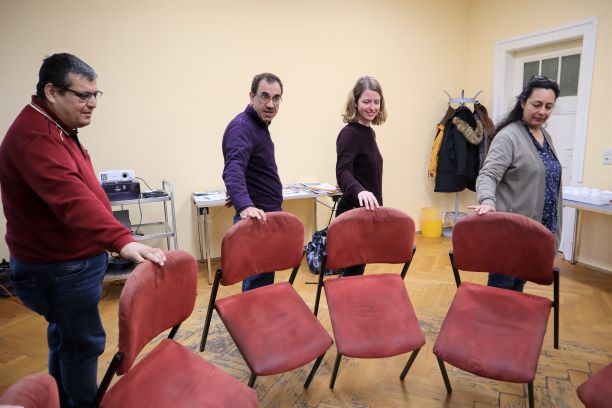
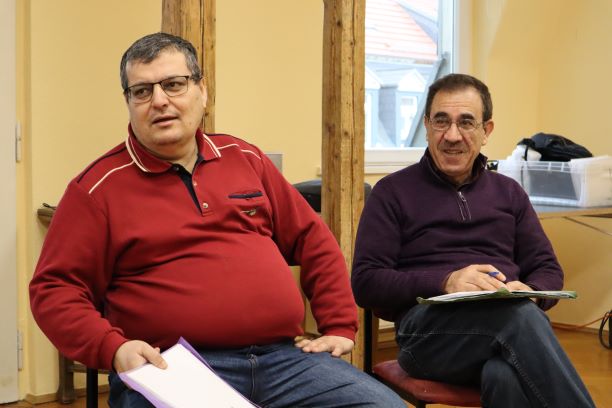
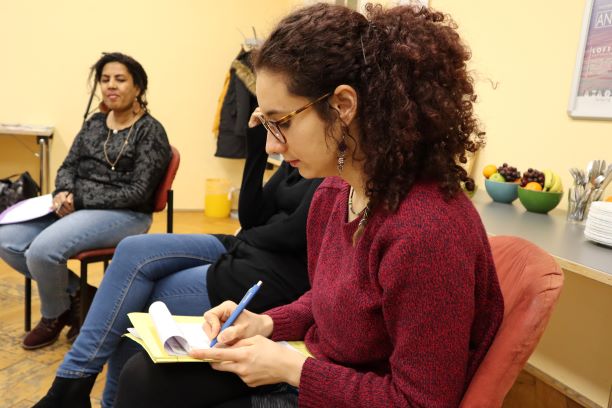
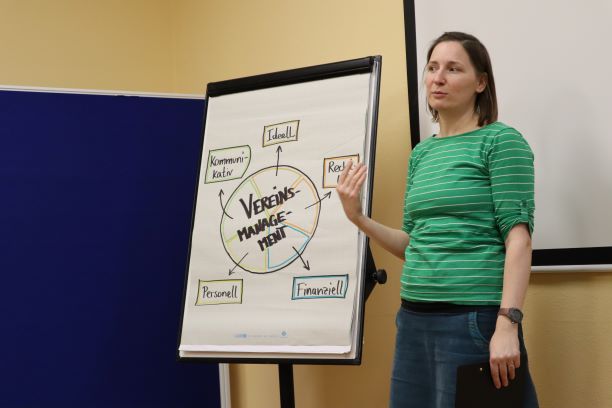
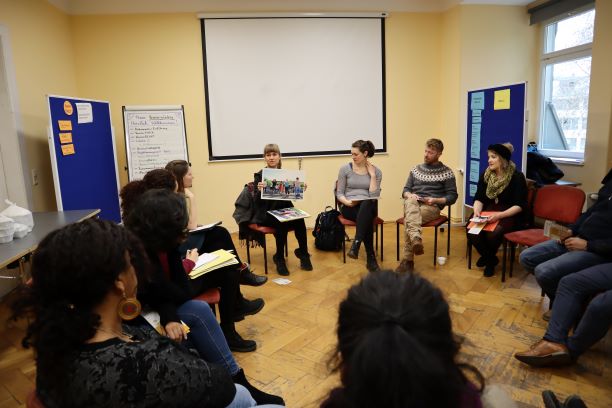
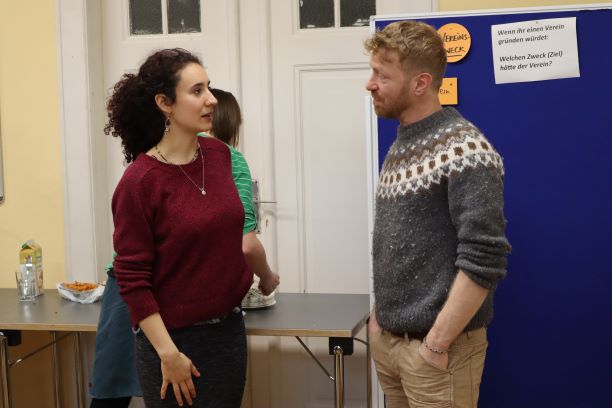
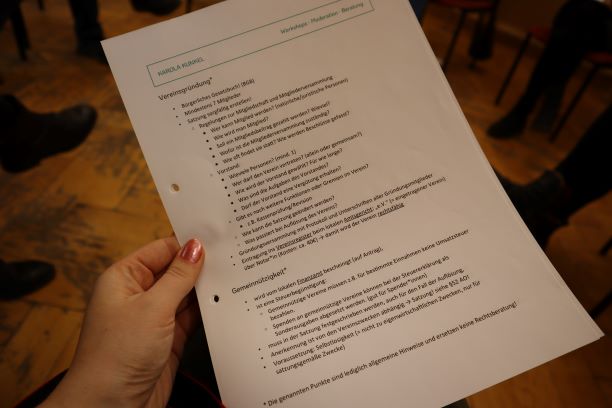
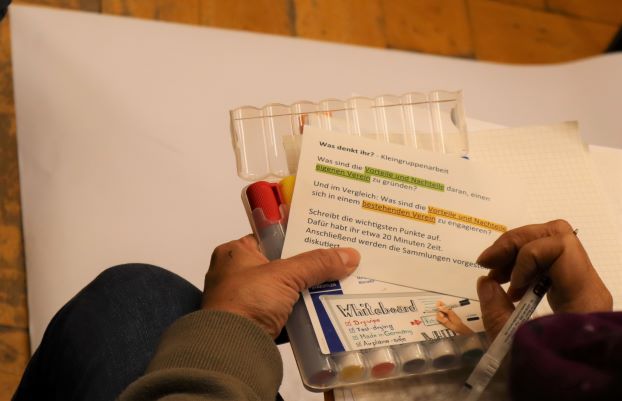
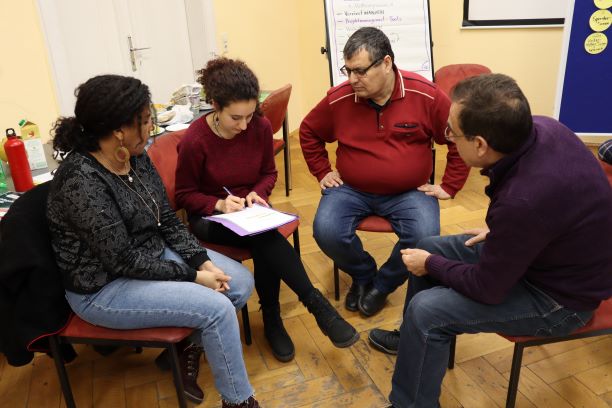
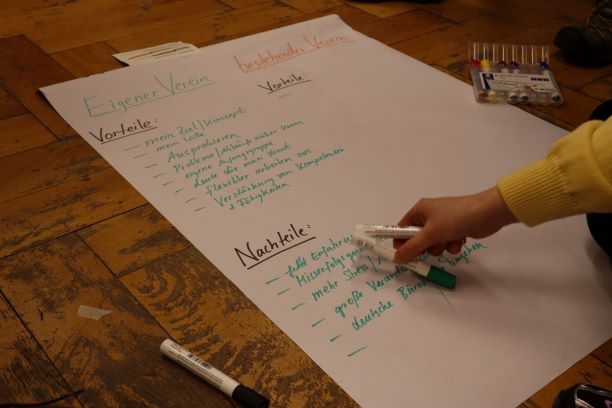
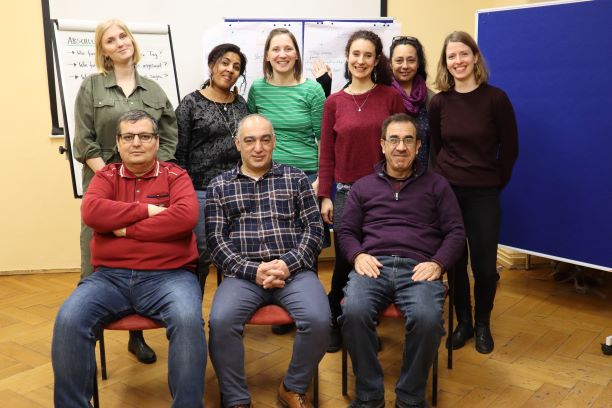
The Second Thematic Block: Engagement in Civil Society Advocacy Organizations
Online-Seminar: “Engagement in Civil Society Advocacy Groups” with Karola Kunkel on 13.05.2020
We are very happy that our project “Frei Will Ich!” could continue! Despite the current difficult situation due to Corona, we managed to get the new online seminar series on engagement in civil society advocacy organizations off the ground. This would not have been possible without our motivated young participants and our trainers, who developed new online formats for this project! Therefore, a big thank you to all involved already at this point!
Since 06.05.2020, the trainer Karola Kunkel first conducted individual meetings with all participants to try out Zoom and Moodle as new platforms with them and to talk about goals and expectations.
Finally, on 13.05.2020, the first group online seminar on Zoom took place, with 8 young people who came to Leipzig from all over the world. Beforehand, the participants had already introduced themselves to the group via Moodle and were able to exchange ideas there. All of them are united by the desire to participate in social life in Leipzig, to become active, and to learn new ways to advocate for their interests and those of others. There is particularly great interest in artistic, theater-pedagogical approaches, which can be addressed in later online seminars.
This online seminar should first clarify the basics. What is engagement anyway? What does voluntary or honorary mean? What is meant by civil society? And what do advocacy organizations do? Civil society engagement is very diverse and takes place in different subject areas: Social issues, culture, human rights, sustainability, peace, co-determination, education. Here, the participants themselves collected examples and experiences of engagement. Interest groups such as student councils, migrant advisory councils, works councils, trade unions, associations or a wide variety of large or small action alliances are committed to these issues.
In small groups, the participants finally discussed the questions: Why is engagement important to you? What kind of commitment do you find important? This gave rise to very interesting discussions. For the participants, commitment is important in order to make a difference. It feels good to help other people and to interact with other people and cultures. Through engagement, society continues to develop. Even though a lot has been achieved for anti-racism and women’s rights in the past, there is still a lot to do! Moreover, civil society engagement is important for democracy and for counteracting anti-democratic tendencies. Every person can get involved, no matter how small you start. Every step counts!
Next week Wednesday, 5/20/20 from 4-6pm, Alexandra Will will take on the exciting topic of “Citizenship Education. How Self-Determined Active Participation Works.” We look forward to seeing all participants again!
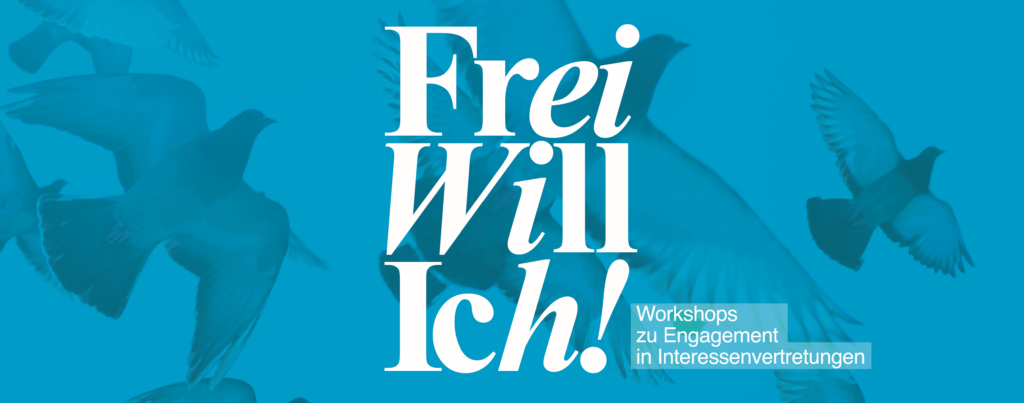
The Second Thematic Block: Engagement in Civil Society Advocacy Groups
Online Seminar: “Democracy Education and Citizenship Education – How Self-Determined Active Participation Works” with Alexandra Will on 20. and 27.05.2020
On May 20 and 27, the 2nd part of our Free Will Me! online seminar on engagement in civic advocacy took place. The trainer Alexandra Will covered the topic of democracy building and citizenship education and introduced participants to nonviolent protest and different forms of action, both in theory and in practice.
The goal of these two online seminars was to “pack a suitcase of forms of action.” These forms of action were to be sorted according to escalation levels and supplemented by a guide for action planning.
At the beginning of the online seminar, participants were asked to find an object in their home that was a symbol of their personal heart issue that they would like to take action on. After 2 minutes, they then held their objects up to the camera: a pen for freedom of expression and the right to education; a glass of water for water safety and environmental protection; the Basic Law for equality of all people before the law; a Colombian bag for intercultural awareness; cheese for fair distribution of resources around the world; a flyer for better design of everyday objects.
Afterwards, the participants collected different forms of action together with the trainer.
After a presentation about active nonviolence and the success of nonviolent actions, the escalation stages according to Theodor Ebert were presented and the action forms were assigned to these stages: Protest, Functional Demonstration, Legal Non-Collaboration, Legal Role Innovation, Civil Disobedience and Civil Usurpation.
Afterwards, the participants had the opportunity to get to know the umbrella organization and advocacy group DaMigra e.V.. Delia Youssef presented the Leipzig project MUTmacherinnen* as well as possibilities of engagement at DaMigra and answered questions of the participants.
A week later, the group met again via Zoom for the second part of the online seminar. In the meantime, they coordinated into 3 groups to plan an action on a social issue of their choice. We were very impressed with the ideas the groups came up with in such a short time. To identify and analyze a problem in the first place, one group even conducted an online survey about discrimination against women with hijab. Based on that, they developed possible concepts for actions, including a photo exhibition, online campaigns or empowerment workshops for women. As the project progresses, the groups will have more time to flesh out their plans and actually implement them.
Afterwards, another Leipzig advocacy group introduced itself: the Migrant Advisory Council. Mr. Hassan Zeinel Abidine reported about the foundation, the tasks and the difficulties of the Migrants Advisory Board and answered all questions of the participants.
The group was very happy about the online seminar contents, especially about the practical orientation and the good mood, which was provided by the trainer Alexandra Will.
The week after next, Wednesday, 10.06.2020 from 4 to 6 pm, Markus Wutzler will take over the exciting topic “Civil Society Activism – How to find the right format for your engagement”. We look forward to seeing all participants again!
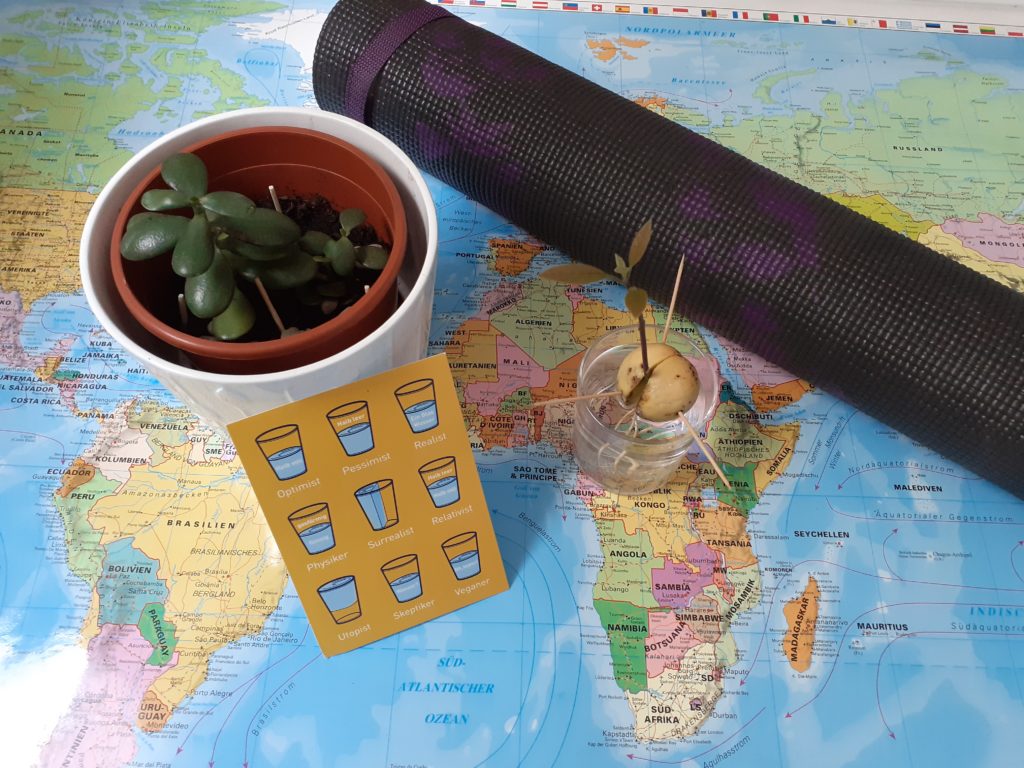
The Second Thematic Block: Engagement in Civil Society Advocacy Groups
Online seminar: “Civil Society Activism. How to find the right format for your engagement” with Markus Wutzler on 10.06. and 18.06.2020
On June 10 and 18, 2020, we held the 3rd part of our Frei Will Ich! online seminar series on engagement in civil society advocacy took place. Trainer Markus Wutzler covered the topic of civil society activism and taught participants how to find the right format for their engagement.
Unfortunately, only 2 people were able to participate in the online seminar on 10.06.2020, but this did not diminish the quality. This gave the 2 participants more opportunities to ask questions and exchange ideas with each other.
First, the speaker explained what a social movement is and what advocacy is. Then, the group collected examples of Leipzig advocacy movements and categorized them under different themes, including culture, environment and transportation, anti-racism, integration, education, and science. How do these movements achieve change? Some movements work at the grassroots and reach many people there with demonstrations or workshops, while others reach fewer key people like politicians at the “top level.”
While some movements pursue easy changes and small goals, others aim for fundamental changes and big goals. In this context, it is a strategic question of what and whom to reach.
One advocacy group that does both grassroots work and engages with politicians at upper levels is the German Youth in Europe Federal Association (DJO). At the end of this online seminar, David Marx and Mohammad Mohammad introduced themselves and presented the DJO project DEMOcratize (democratize.de). They support young migrants with their project ideas and want to build up a representation of the interests of migrant youth in Saxony. The participants were very enthusiastic about the project and emphasized how important democratic education is for migrants, especially if they come from non-democratic countries.
By moving the 2nd online seminar part to Thursday, five people were able to attend on 6/18/2020. One participant shared her excitement about the webinar series with friends and invited them to the online seminar.
This time the question was: how do we analyze a problem and how do we choose the right topic for our engagement? For this, 4 steps are important: 1. take yourself and the problem seriously! 2. research and collect information! 3. analyze the background of the problem! 4. decide consciously for a topic or a partial problem!
Using the example of racism in Leipzig schools, we acted out this process of analysis and decision-making as a group. Racism does not solve itself. We all have to do something about it, because racism is not the problem of migrants, but the problem of white people. Anti-racism trainings are needed to understand this. Using the method of “propping up power,” together we identified factors that perpetuate the problem of racism in schools, such as racist parents and teachers, ignorance, and that many children do not know their own rights. But which sustaining factors do you let collapse first? Where do you start? That depends on many criteria: Resources, needs, openness for change, “Windows of Oppotunity” and many more. The important thing is: We think the topic is right and important AND the action can work! In the next weeks, the participants will continue to work on a problem of their choice and try to find a solution for this problem in the form of an action or campaign.
This time, “Equal. Together. Learn.” introduced itself via video message. They are founding a free, democratic school and a daycare center and are campaigning for a better education system. One participant said, “I think it’s great that advocacy groups introduce themselves in every online seminar. I’m always excited to see so many people doing something. That motivates me a lot.”
Next week, Thursday, June 25, 2020 from 5 to 7 p.m., Markus Wutzler will take on the exciting topic “Public Relations and Lobbying. How to effectively represent your interests.” We look forward to seeing all participants again!
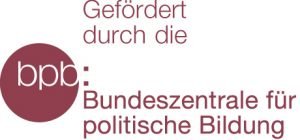
The Second Thematic Block: Engagement in Civil Society Advocacy Groups
Online seminar: “Public Relations and Networking. How to Represent Your Interests Effectively” with Markus Wutzler on 25.06. and 02.07.2020
On June 25 and July 02, 2020, the 4th part of our Frei Will Ich! webinar series on engagement in civil society advocacy took place. Trainer Markus Wutzler covered the topic of public relations and networking and taught participants how to effectively represent their interests.
In addition, another Leipzig-based interest group presented itself on 25.06.2020: ver.di, the United Services Union. Youth secretary Ulrike Jacob explained in detail what a trade union is, how collective agreements are concluded, how ver.di supports its members (financial protection in the event of a strike, income tax service, leisure time accident insurance, labor and social legal protection, review of employment contracts, and much more). In addition, ver.di also has an impact on society and works with the Federal Migration Committee to promote social, societal and workplace equality for migrants.
In the first public relations seminar on 25.06.2020, some basics were first laid: What is public relations? What can it look like? What experience do the participants have with public relations? While some participants had never dealt with this topic before, others could already report on their own experiences that they had made in other associations.
Despite different previous experiences, the group was able to use a concrete example to think together about what public relations work could look like if they wanted to tackle the previously mentioned problem of racism in schools. To do this, they considered which target groups they wanted to reach, what their goals were, and what content and tools they would use to reach the right people. The group came to the important conclusion that it could be useful to start at the grassroots level (e.g. with parents) in order to then address higher levels (e.g. teachers, school management, ministries) with a common voice.
Until the next online seminar, participants could try their hand at creating a message of their choice. What makes a message most effective are the following points: It describes the problem. It identifies a solution. It shows the benefits to others and myself. It tells me exactly what I can do.
On 02.07.2020, one participant presented her message to the group. She had drafted an exemplary event invitation on the topic “Overcoming racism at school”, which was discussed in the group. This task was a very helpful exercise through which she realized how difficult it is to describe a clear goal and develop a strategy for it.
The seminar then continued with another practical exercise: the “Elevator Pitch”. We stayed with the example of racism in school, as this was considered very important by the participants. In groups of two, participants were asked to think about what they would say to the school principal if they met her at the supermarket checkout. They would have 1 minute to convince her that racism was a serious problem at the school. The participants then practiced this conversation in distributed roles and then shared their arguments, strategies, and difficulties with the group.
Finally, the trainer explained what lobbying is and gave valuable tips from Thorben Prenzel’s book “Lobbying for Beginners” (2019).
Finally, all participants thanked each other and DOZ: “I am very much looking forward to using the theory I have learned in these seminars in my future engagement! It was also very very great to meet new people and discover many different perspectives. I hope we can meet together in the future and share the results from our projects and maybe get to know each other even better.”
We wish all participants much success and fun in their engagement and look forward to seeing them again soon at our reflection rounds!
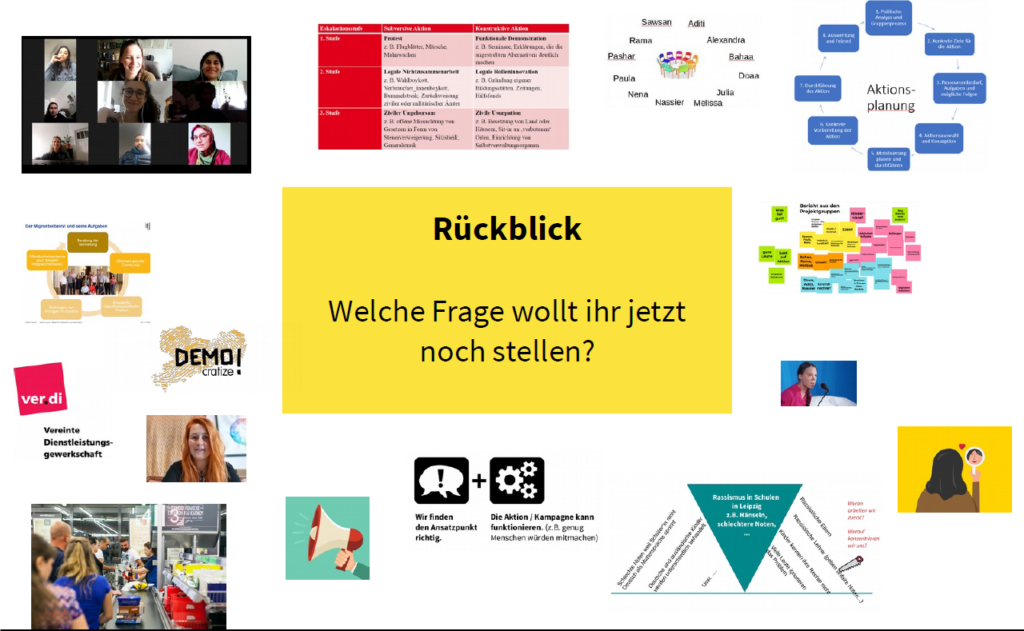
Success Stories
One of the success stories was Paula Sanchez who was one of the participants in those capacity buildings workshops in our Frei Will ich project in 2020. Paula managed to do voluntary work at some organizations in Leipzig in through this project and since 2022 Leipzig managed to get employed by DOZ e.V. Germany as a Project Coordinator for our BMI funded ongoing Project ” Our Common Garden – Leipzig”.


